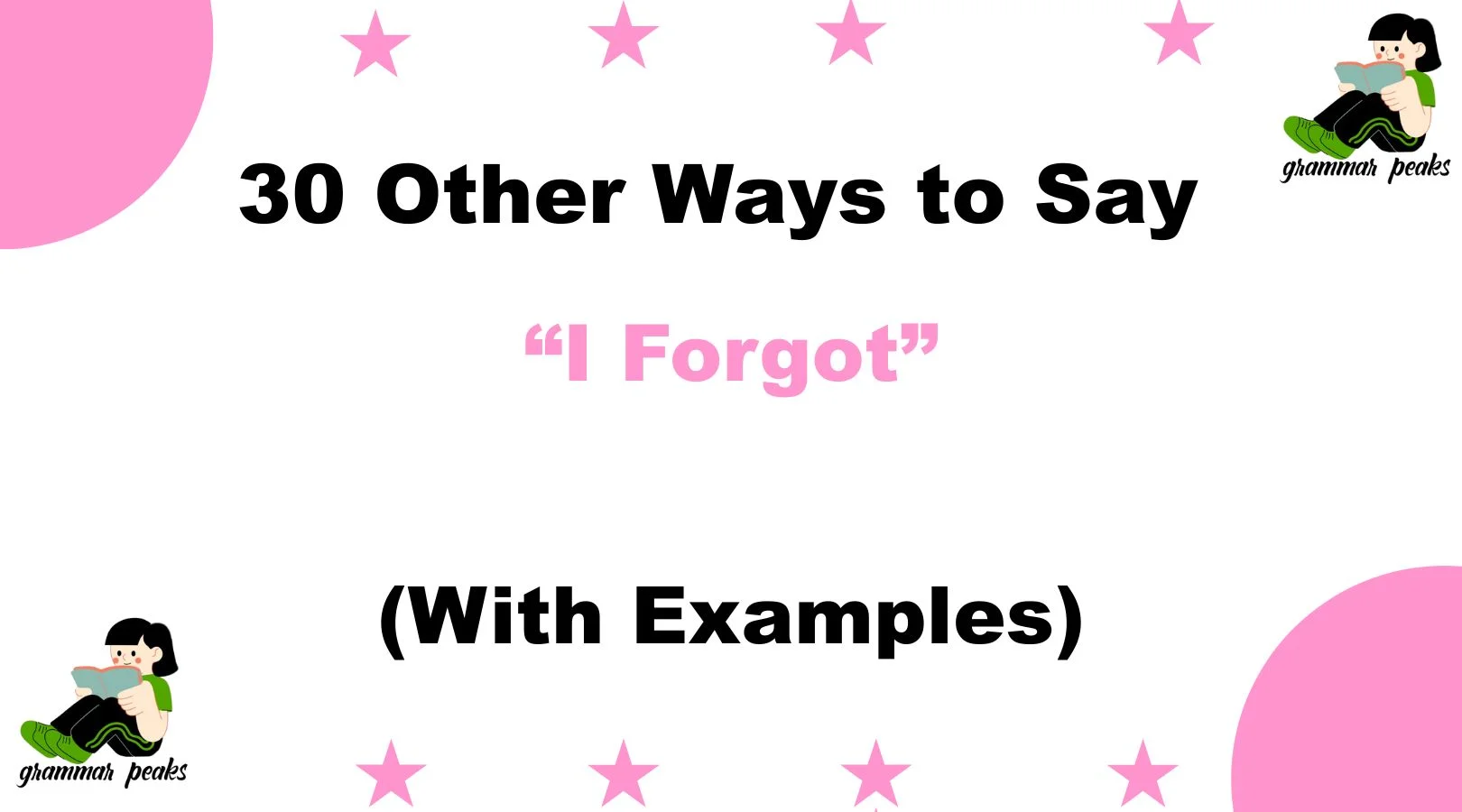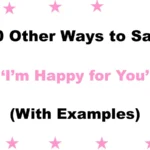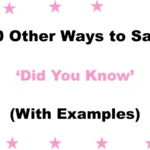In professional, academic, or casual settings, admitting that you forgot something can be uncomfortable. However, the way you express it can make a big difference. Instead of simply saying “I forgot,” using thoughtful, tactful, or humorous alternatives can help you maintain credibility, show responsibility, or lighten the mood. Whether you’re emailing a colleague, apologizing to a friend, or addressing a missed deadline, here are 30 alternatives that communicate forgetfulness in a smarter, more considerate way.
What Does “I Forgot” Mean?
“I forgot” is a simple phrase used to admit that something slipped your mind or wasn’t remembered at the right time. It’s honest, but it can sometimes come across as careless if used too often or without explanation.
When to Use “I Forgot”
Use “I forgot” or a variation of it when you’ve failed to remember something important, like a meeting, task, name, deadline, or commitment. In formal contexts, it’s better to phrase it more diplomatically or take responsibility rather than just stating forgetfulness.
Is It Professional or Polite to Say “I Forgot”?
While honest, “I forgot” can sound careless or unprepared in professional environments. It’s more professional to reframe it as “It slipped my mind,” “I didn’t have it on my radar,” or “I failed to note it down.” These alternatives convey accountability with a more polished tone.
Pros and Cons of Saying “I Forgot”
Pros:
- Honest and straightforward
- Quick and relatable
Cons:
- May sound careless or lazy
- Lacks professionalism
- Can damage credibility over time
Synonyms For “I Forgot”
- It Slipped My Mind
- I Completely Overlooked That
- That Escaped Me
- I Didn’t Remember
- I Spaced Out
- My Mind Went Blank
- I Missed That
- It Didn’t Register
- I Dropped the Ball
- I Blank(ed) on That
- That Slipped Through the Cracks
- I Lost Track of That
- It Didn’t Cross My Mind
- I Neglected to Do That
- I Didn’t Make a Note of That
- It Wasn’t on My Calendar
- I Overcommitted Myself
- I Wasn’t on Top of That
- It Got Away From Me
- I Let It Slip
- I Missed That Detail
- I Didn’t Retain That
- It Wasn’t Top of Mind
- I Didn’t Prioritize That
- I Lost Sight of That
- I Didn’t Think About It Again
- I Mentally Flagged It but Didn’t Act
- That Was Off My Radar
- I Didn’t Connect the Dots
- I Owe You One—Totally Spaced That
1. It Slipped My Mind
Definition: A softer, more casual way of saying you forgot something.
Detailed Explanation: This phrase implies forgetfulness without sounding irresponsible. It’s more socially accepted in both personal and semi-professional settings.
Scenario Example: “Sorry, it totally slipped my mind to follow up on that report.”
Best Use: Casual emails, light conversations, or admitting small oversights.
Worst Use: Critical deadlines or formal meetings.
Tone: Informal, mild.
2. I Missed That
Definition: A subtle way to acknowledge an oversight.
Detailed Explanation: Suggests the information wasn’t noticed, not necessarily forgotten, which can be less harsh in professional contexts.
Scenario Example: “I missed that update in the memo—thanks for pointing it out.”
Best Use: In meetings or collaborative work.
Worst Use: When complete responsibility lies with you.
Tone: Professional, neutral.
3. That Completely Escaped Me
Definition: A more expressive way to say something was forgotten.
Detailed Explanation: Implies the information just didn’t register or was momentarily out of mind.
Scenario Example: “That completely escaped me—I’ll send it over now.”
Best Use: In follow-up emails or apologies.
Worst Use: With clients or executives where precision is expected.
Tone: Honest, expressive.
4. I Didn’t Have It on My Radar
Definition: Indicates something wasn’t in your awareness or active attention.
Detailed Explanation: Good for downplaying the severity of the oversight while sounding accountable.
Scenario Example: “I didn’t have that on my radar—thanks for flagging it.”
Best Use: Internal team communication.
Worst Use: Critical mistakes or sensitive issues.
Tone: Calm, modern.
5. I Overlooked That
Definition: Admits that you saw it but didn’t act or register it.
Detailed Explanation: Better for professional contexts where you want to sound responsible.
Scenario Example: “I overlooked that step in the process—I’ll fix it right away.”
Best Use: Formal reports or client-facing messages.
Worst Use: When the mistake was due to total forgetfulness.
Tone: Professional, responsible.
6. I Dropped the Ball
Definition: An idiomatic way to take responsibility for a mistake.
Detailed Explanation: Shows honesty and ownership, often used in workplace culture.
Scenario Example: “I dropped the ball on that task—I’ll get it back on track.”
Best Use: When admitting fault to teammates.
Worst Use: In highly formal or conservative environments.
Tone: Informal, self-aware.
7. That Didn’t Register
Definition: Suggests the information didn’t stick in your mind.
Detailed Explanation: Less blunt than “I forgot” and implies a momentary lapse rather than neglect.
Scenario Example: “Sorry, that didn’t register with me when we first talked.”
Best Use: During clarification or feedback moments.
Worst Use: When high responsibility is expected.
Tone: Soft, reflective.
8. I Meant To, But It Slipped
Definition: Combines intention with forgetfulness.
Detailed Explanation: Highlights that you weren’t negligent, just momentarily distracted.
Scenario Example: “I meant to send that over last night, but it slipped.”
Best Use: In casual apologies or friendly reminders.
Worst Use: In formal reports.
Tone: Friendly, relatable.
9. I Didn’t Get Around to It
Definition: Suggests delay rather than pure forgetfulness.
Detailed Explanation: Blends forgetfulness with time management issues, often used conversationally.
Scenario Example: “I didn’t get around to finishing that report yet—working on it now.”
Best Use: Casual team settings or updates.
Worst Use: If deadlines were clearly stated.
Tone: Informal, nonchalant.
10. My Mind Was Elsewhere
Definition: Indicates distraction rather than intentional forgetfulness.
Detailed Explanation: Explains memory lapse without sounding careless.
Scenario Example: “My mind was elsewhere during the meeting—I missed that action item.”
Best Use: Honest conversations with colleagues or friends.
Worst Use: In performance evaluations or critical moments.
Tone: Reflective, apologetic.
11. That Slipped Through the Cracks
Definition: Indicates something was unintentionally missed among other priorities.
Detailed Explanation: Suggests that the omission wasn’t deliberate—it just got lost in the shuffle.
Scenario Example: “Apologies, that slipped through the cracks during a hectic week.”
Best Use: When juggling multiple responsibilities.
Worst Use: If the task was high-priority.
Tone: Honest, slightly apologetic.
12. I Lost Track of That
Definition: Indicates that you failed to stay aware of a detail or responsibility.
Detailed Explanation: Useful when deadlines or small tasks weren’t properly followed.
Scenario Example: “I lost track of that email—I’ll follow up now.”
Best Use: Low-stakes oversights.
Worst Use: Time-sensitive or critical errors.
Tone: Neutral, accountable.
13. It Didn’t Cross My Mind
Definition: Suggests you never even thought about it.
Detailed Explanation: More casual and transparent; not ideal in formal settings.
Scenario Example: “To be honest, it didn’t cross my mind to check the file again.”
Best Use: With close colleagues or in personal interactions.
Worst Use: Formal or official reports.
Tone: Candid, informal.
14. I Neglected to Do That
Definition: Admits fault with a touch of responsibility.
Detailed Explanation: Shows professionalism, especially when accepting blame.
Scenario Example: “I neglected to update the spreadsheet—I’ll correct it now.”
Best Use: In professional emails or status updates.
Worst Use: When trying to avoid admitting fault.
Tone: Formal, responsible.
15. I Didn’t Make a Note of That
Definition: Indicates a planning or documentation failure.
Detailed Explanation: Puts the blame on the lack of record-keeping rather than forgetfulness.
Scenario Example: “I didn’t make a note of the deadline, but I’ll prioritize it now.”
Best Use: Meeting follow-ups or action items.
Worst Use: In spontaneous conversations.
Tone: Thoughtful, neutral.
16. It Wasn’t on My Calendar
Definition: A tech-friendly way to explain missing something.
Detailed Explanation: Reflects on a system error more than personal neglect.
Scenario Example: “I didn’t see it on my calendar, or I would’ve joined the call.”
Best Use: Scheduling mishaps.
Worst Use: Non-scheduled responsibilities.
Tone: Practical, slightly detached.
17. I Overcommitted Myself
Definition: Admits that too many tasks led to a lapse.
Detailed Explanation: A graceful way to explain that forgetfulness was due to overwhelm.
Scenario Example: “I overcommitted this week, and that task slipped.”
Best Use: When discussing workload or missed expectations.
Worst Use: For repeated mistakes.
Tone: Honest, reflective.
18. I Wasn’t on Top of That
Definition: Acknowledges loss of control or attention.
Detailed Explanation: Softens the admission while taking responsibility.
Scenario Example: “I wasn’t on top of the timeline, but I’ll fix it moving forward.”
Best Use: Team updates, check-ins.
Worst Use: Sensitive or high-profile projects.
Tone: Casual, constructive.
19. It Got Away From Me
Definition: Suggests the situation or task became unmanageable or forgotten.
Detailed Explanation: Expresses forgetfulness with empathy and relatability.
Scenario Example: “That task just got away from me this week—I’ll refocus.”
Best Use: When rebuilding trust or accountability.
Worst Use: Extremely formal contexts.
Tone: Relatable, humble.
20. I Let It Slip
Definition: Admits forgetting something unintentionally.
Detailed Explanation: Puts the mistake on momentary lapse rather than systemic neglect.
Scenario Example: “I let that email slip—I’ll respond right now.”
Best Use: Low-impact forgetfulness.
Worst Use: Repeated errors.
Tone: Casual, slightly apologetic.
21. I Missed That Detail
Definition: Points to a specific piece of missed information.
Detailed Explanation: Sounds more professional than saying “I forgot.”
Scenario Example: “I missed that detail in the specs—I’ll revise the draft.”
Best Use: Reports, editing, or project updates.
Worst Use: Total task forgetfulness.
Tone: Professional, specific.
22. I Didn’t Retain That
Definition: Suggests that you heard it but didn’t remember it long-term.
Detailed Explanation: Useful for conversations or information overload scenarios.
Scenario Example: “I didn’t retain that part of the training—we might need a refresher.”
Best Use: Learning or instruction-based discussions.
Worst Use: When you never engaged at all.
Tone: Intellectual, self-aware.
23. It Wasn’t Top of Mind
Definition: Indicates it wasn’t in your active awareness.
Detailed Explanation: Sounds thoughtful and avoids sounding careless.
Scenario Example: “That wasn’t top of mind during the meeting—I’ll circle back.”
Best Use: In calm, reflective conversations.
Worst Use: Emergency or fast-paced environments.
Tone: Polished, introspective.
24. I Didn’t Prioritize That
Definition: Honest admission that the task wasn’t treated as important.
Detailed Explanation: Suggests the lapse was in prioritization, not attention span.
Scenario Example: “I didn’t prioritize that last week—apologies, I’ll fix it.”
Best Use: With mature teams or leadership.
Worst Use: When full responsibility is on you.
Tone: Accountable, direct.
25. I Lost Sight of That
Definition: Indicates you were aware at some point but forgot over time.
Detailed Explanation: Often used to show gradual forgetfulness.
Scenario Example: “I lost sight of the original plan—thanks for the reminder.”
Best Use: In long-term projects or collaborative tasks.
Worst Use: Tight deadline misses.
Tone: Reflective, honest.
26. I Didn’t Think About It Again
Definition: Direct way to say something was forgotten after first hearing it.
Detailed Explanation: Lacks polish, but can feel honest in the right tone.
Scenario Example: “I didn’t think about it again until just now—my mistake.”
Best Use: Casual conversations.
Worst Use: Important communications.
Tone: Blunt, informal.
27. I Mentally Flagged It but Didn’t Act
Definition: Suggests you acknowledged the task but didn’t follow through.
Detailed Explanation: Admits a disconnect between thought and action.
Scenario Example: “I mentally flagged it but didn’t follow through—thanks for the nudge.”
Best Use: Thoughtful professional replies.
Worst Use: When actions were clearly required.
Tone: Reflective, conversational.
28. That Was Off My Radar
Definition: Another version of not noticing something.
Detailed Explanation: Suggests it wasn’t even on your awareness list.
Scenario Example: “That request was off my radar—I’ll take care of it.”
Best Use: Task or project acknowledgment.
Worst Use: In critical accountability settings.
Tone: Professional, tactful.
29. I Didn’t Connect the Dots
Definition: Suggests you didn’t realize its importance or timing.
Detailed Explanation: Good for misunderstandings or nuanced details.
Scenario Example: “I didn’t connect the dots that it was due today—sorry for the delay.”
Best Use: Projects, strategy discussions.
Worst Use: Simple or direct instructions.
Tone: Reflective, analytical.
30. I Owe You One—Totally Spaced That
Definition: A light, friendly way of admitting forgetfulness.
Detailed Explanation: Great for casual or personal settings where you want to keep it humorous.
Scenario Example: “I owe you one—I totally spaced that appointment!”
Best Use: Friendly reminders or group chats.
Worst Use: Professional or formal communication.
Tone: Playful, casual.
Conclusion: Expressing Forgetfulness with Grace and Clarity
Forgetting something happens to everyone—it’s part of being human. But how you express that moment of forgetfulness can make all the difference in how your message is received. Whether you’re speaking to a colleague, a friend, or a supervisor, choosing the right phrase shows accountability, professionalism, and even empathy.
This guide offered 30 distinct ways to say “I forgot,” each with its own tone, context, and best use. From formal phrases like “I neglected to do that” to friendly options like “It totally slipped my mind,” you now have a diverse vocabulary for handling those “oops” moments with authenticity.
Remember: it’s not just about admitting the mistake—it’s about how you move forward after it.
FAQs About Other Ways to Say “I Forgot”
Q1: What is the most professional way to say “I forgot”?
A: Phrases like “I neglected to do that”, “I lost sight of that”, or “That slipped through the cracks” offer a polished and responsible tone, making them ideal in workplace communication.
Q2: Can I use humorous alternatives like “I spaced out” in professional settings?
A: Only if the workplace culture is informal or you have a casual rapport. Otherwise, stick with neutral or formal expressions to maintain credibility.
Q3: What’s the best phrase to use in a written apology for forgetting?
A: Try “I sincerely apologize, I completely overlooked that” or “That escaped me, and I take full responsibility” to show sincerity and ownership.
Q4: How do I avoid sounding careless when admitting I forgot something?
A: Pair your phrase with a solution or a forward-looking action. For example: “I didn’t retain that part, but I’ll make a note for next time and review it again.”
Q5: Are there any phrases that sound too casual for work emails?
A: Yes. Avoid terms like “I blanked”, “I spaced out”, or “I owe you one” in formal settings. These are better suited for conversations with friends or peers.

Mia Rose is a passionate Language Coach and Contributor at GrammarPeaks, where she specializes in practical grammar tips and language learning strategies. With a strong foundation in education and communication, Mia brings a friendly, approachable style to her writing. Her goal is to make complex grammar rules simple and usable for learners at any level, helping them grow in both confidence and fluency.





